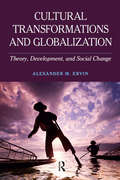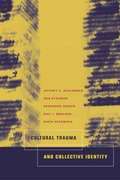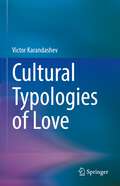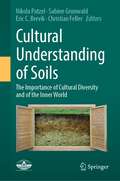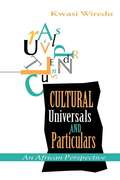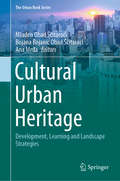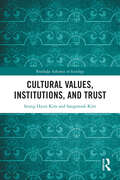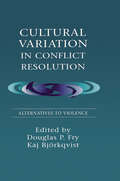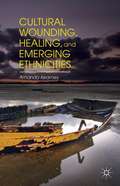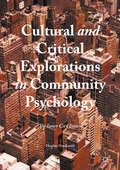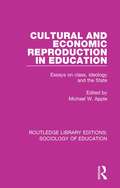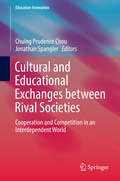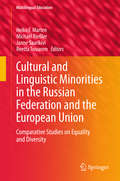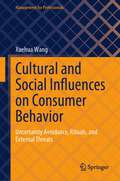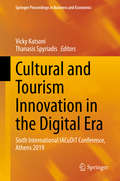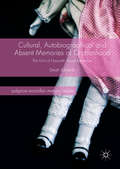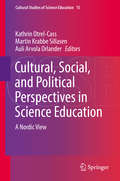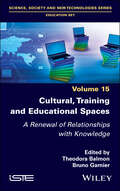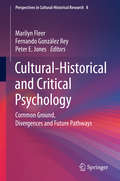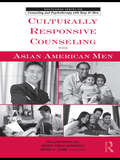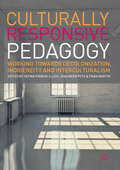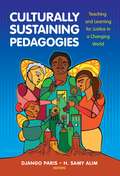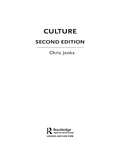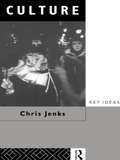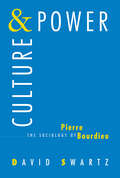- Table View
- List View
Cultural Transformations and Globalization: Theory, Development, and Social Change
by Alexander M ErvinChange is the most significant factor of contemporary society and humanity s past. This book represents the first substantial attempt since the 1970s to synthesize and critique sociocultural change theories in anthropology and relate them to trends in the social and physical sciences. It emphasizes the most recent contributions especially complexity and emergence theory, social movements, network analysis, and globalization. Ervin presents a rich legacy of theories and case studies accessible to both the established scholar and the beginning student. He considers how theories and insights can inform policy as humanity faces crises of globalization.Key Features of the Text Designed for scholars and students seeking a comprehensive analysis of the relation between anthropological theory and practice. Assesses big questions facing the social sciences: Do cultures and societies change or is it really individuals, families, and social networks? Are there prime movers of change environment, technology, economics, ideas, powerful leaders, or cultural contacts? Are there structures embedded within changes and changes built into structures? Original contribution of the book is the integration of sociological and anthropological theories, including networks, social movements, complexity, world systems, etc. Online appendices include resources for students on applied and practice anthropology."
Cultural Trauma and Collective Identity
by Neil J. Smelser Jeffrey C. Alexander Ron Eyerman Bernard Giesen Piotr SztompkaIn this collaboratively authored work, five distinguished sociologists develop an ambitious theoretical model of "cultural trauma"--and on this basis build a new understanding of how social groups interact with emotion to create new and binding understandings of social responsibility. Looking at the "meaning making process" as an open-ended social dialogue in which strikingly different social narratives vie for influence, they outline a strongly constructivist approach to trauma and apply this theoretical model in a series of extensive case studies, including the Nazi Holocaust, slavery in the United States, and September 11, 2001.
Cultural Typologies of Love
by Victor KarandashevThis timely volume offers an integrative approach and a culturally diverse view of love conceptions, experiences, and expressions, building on both individual and cultural typologies of love. It comprehensively presents cultural and cross-cultural studies on how culture affects love, and offers a systematic description of types and cultural models of love. The comprehensive reviews of methodology and findings provide a solid empirical basis for the creation of formal typologies. This book will be useful for researchers interested in cross-cultural studies of love across many disciplines. Its accessible language also makes it ideal for undergraduate and graduate students. Readers will gain a comprehensive understanding of: Cultural conceptions of love and methods for their research Multiple perspectives in the studies of love across world cultures Cultural models and typologies in an international perspectiveCultural models and typologies from an interdisciplinary scientific perspective
Cultural Understanding of Soils: The importance of cultural diversity and of the inner world
by Christian Feller Sabine Grunwald Eric C. Brevik Nikola PatzelCultural understandings of soil are diverse and often ambiguous. Cultural framing of soils is common worldwide and is highly consequential. The implications of what place the earth has in people's world view and everyday life can be in line with or in conflict with natural conditions, with scientific views, or with agricultural practices. The main assumption underlying this work is that soil is inescapably perceived in a cultural context by any human. This gives emergence to different significant webs of meaning influenced by religious, spiritual, or secular myths, and by a wide range of beliefs, values and ideas that people hold in all societies. These patterns and their dynamics inform the human-soil relationship and how soils are cared for, protected, or degraded.Therefore, there is need to deal inter-culturally with different sources and types of knowledge and experience regarding soil; a need to cultivate soil awareness and situationally appropriate care through inter- and intra-cultural dialogues and learning. This project focuses on the human and intangible dimensions of soil.To serve this aim, the International Union of Soil Sciences (IUSS) founded a working group on Cultural Patterns of Soil Understanding that has resulted in this book, which presents studies from almost all continents, written by soil scientists and experts from other disciplines. A major objective of this project is to promote intercultural literacy that gives readers the opportunity to appreciate soil across disciplinary and cultural boundaries in an increasingly globalized world. . .
Cultural Universals and Particulars: An African Perspective
by Kwasi WireduMasolo Ghanaian philosopher Kwasi Wiredu confronts the paradox that while Western cultures recoil from claims of universality, previously colonized peoples, seeking to redefine their identities, insist on cultural particularities. Wiredu asserts that universals, rightly conceived on the basis of our common biological identity, are not incompatible with cultural particularities and, in fact, are what make intercultural communication possible. Drawing on aspects of Akan thought that appear to diverge from Western conceptions in the areas of ethics and metaphysics, Wiredu calls for a just reappraisal of these disparities, free of thought patterns corrupted by a colonial mentality. Wiredu's exposition of the principles of African traditional philosophy is not purely theoretical; he shows how certain aspects of African political thought may be applied to the practical resolution of some of Africa's most pressing problems.
Cultural Urban Heritage: Development, Learning and Landscape Strategies (The Urban Book Series)
by Mladen Obad Šćitaroci Bojana Bojanić Obad Šćitaroci Ana MrđaThis book presents strategies and models for cultural heritage enhancement from a multidisciplinary perspective. It discusses identifying historical, current and possible future models for the revival and enhancement of cultural heritage, taking into consideration three factors – respect for the inherited, contemporary and sustainable future development. The goal of the research is to contribute to the enhancement of past cultural heritage renovation and enhancement methods, improve the methods of spatial protection of heritage and contribute to the development of the local community through the use of cultural, and in particular, architectural heritage. Cultural heritage is perceived primarily through conservation, but that comes with limitations. If heritage is perceived and experienced solely through conservation, it becomes a static object. It needs to be made an active subject, which implies life in heritage as well as new purposes and new life for abandoned heritage. Heritage can be considered as a resource that generates revenue for itself and for the sustainability of the local community. To achieve this, it should be developed in accordance with contemporary needs and technological achievements, but on scientifically based and professional criteria and on sustainable models. The research presented in this book is based on the approach of Heritage Urbanism in a combination of experiments (case studies) and theory.
Cultural Values, Institutions, and Trust (Routledge Advances in Sociology)
by Sangmook Kim Seung Hyun KimUsing experimental surveys as a primary source, Kim and Kim compare a wide range of developed countries to assess the determinants of generalized social trust. With data from Belgium, France, Italy, Japan, Singapore, South Korea, the Netherlands, and the United States, Kim and Kim present a detailed picture of trust at the individual level, across different ethnic groups, and across different regions with economic and cultural distinctions. They focus on a range of concepts, including generalized trust and familism; causal relationships among cultural values, particularized trust, and institutional trust at the individual level; and relationships between culture, wealth, and governance at the macro-level. In doing so, they consolidate substantial quantitative data with rigorous theoretical analysis and advance our understanding of social trust and prosociality in general. A valuable resource for researchers and advanced students in political science, sociology, and social psychology around the world.
Cultural Variation in Conflict Resolution: Alternatives To Violence
by Douglas P. Fry Kaj BjörkqvistThis volume's central purpose is to provide a clearly written, scholarly exploration of cultural variation regarding conflict resolution and in so doing, highlight certain alternatives to violence. It presents an interdisciplinary examination of how conflicts are perceived and handled in a variety of cultural settings. Drawing on data and models from anthropology, psychology, and political science, the chapters analyze conflict resolution across the societal spectrum, including cases from Western and non-Western traditions, complex and tribal societies, and violent and non-violent cultures. While demonstrating the extremely important impact of culture on conflict resolution processes, the book does not solely emphasize cultural specificity. Rather--through introductory chapters, section introductions, and a concluding chapter--the volume editors draw attention to cross-cultural patterns in an attempt to further the search for more general conflict principles. An explicit message throughout the book is that alternatives to violence exist. The volume demonstrates that at various levels--from the interpersonal to the international-- conflicts can be handled in ways that cause far less pain and destruction than violence. Chapters by psychologists discuss social and cognitive processes for facilitating the learning of alternatives to violence among children and youth. Anthropology contributors explore mechanisms for dealing with social conflict which allow some cultures to remain relatively peaceful and consider implications of their work for reducing violence in other societies. Chapters by former President of Costa Rica, Oscar Arias, and by political scientists examine how non-violent political solutions can be employed as alternatives to warfare and violent resistence.
Cultural Wounding, Healing, And Emerging Ethnicities
by Amanda KearneyToday, there is new appeal in the analysis of ethnicity, not merely as innate and fixed identities or fragmented and lost identities, but rather as wounded and then creatively reclaimed. Kearney discusses international examples of cultural wounding and healing and presents two close readings of emerging ethnicities in Australia and Brazil.
Cultural and Critical Explorations in Community Psychology: The Inner City Intern
by Heather MacdonaldThis book engages the practice of community-based psychology through a critical lens in order in order to demonstrate that clinical practice and psychological assessment in particular, require more affirmative psychopolitical agency in the face of racial injustice within the urban environment. Macdonald includes examples of clinical case analyses, vignettes and ethnographic descriptions while also drawing upon a cross-fertilization of theoretical ideas and disciplines. An oft neglected element of community psychology is the practice of community informed psychological assessment, especially within the inner city environments. This book uniquely suggests ideas for how clinical practice, in relationship to issues such as race and cultural memory can serve as a substantial vehicle for social justice against the backdrop of a prejudiced criminal justice system and mental health delivery system.
Cultural and Economic Reproduction in Education: Essays on Class, Ideology and the State (Routledge Library Editions: Sociology of Education #53)
by Michael W. AppleFirst published in 1982, this collection of essays provides an analysis of education’s contradictory role in social reproduction. It looks at the complex relations between the economic, political and cultural spheres of society, both historically and at the time of publication, and hones the wider range of debate in on education. This volume will be of interest to those studying sociology and equality in education.
Cultural and Educational Exchanges between Rival Societies: Cooperation and Competition in an Interdependent World (Education Innovation Series)
by Chuing Prudence Chou Jonathan SpanglerThis book stimulates discussions on cultural and educational exchanges between rival states and societies, raises awareness of the potential positive and negative impacts of such exchanges, and serves as a basis for future research and program design. Cultural and educational exchanges in various forms have existed for millennia. Yet it was not until the unprecedented human devastation of two world wars catalyzed a sense of urgency around the world that a new era of cultural and educational exchange programs emerged as a means of easing tensions between rival states and societies. This book is motivated by the need for critical research that can contribute to building a more comprehensive understanding of the issues at stake. It begins with a historical overview of cultural and educational exchanges between rival societies, an assessment of their positive and negative impacts, and a review of some of the most prominent theories in relevant fields. It then presents a diverse set of case studies, in which authors consider not only the real or expected benefits of such exchanges but also the potentially negative impacts, challenges faced along the way, and broader effects on the rival societies at large. The states and societies considered include North Korea and the West, Bosnia and Herzegovina, Israel and the Palestinian territories, India and Pakistan, China and Taiwan, Cuba and the US, and China and the US. Taken together, the chapters demonstrate that exchanges have observable impacts on the individuals and institutions involved. Moreover, they reveal that exchanges have the capacity, in some cases, to affect broader social and political change at the family, community, society, or state level, but these impacts are indirect and typically require long-term concerted efforts by those involved.
Cultural and Linguistic Minorities in the Russian Federation and the European Union: Comparative Studies on Equality and Diversity (Multilingual Education #13)
by Reetta Toivanen Janne Saarikivi Heiko F. Marten Michael RießlerThis is the first comprehensive volume to compare the sociolinguistic situations of minorities in Russia and in Western Europe. As such, it provides insight into language policies, the ethnolinguistic vitality and the struggle for reversal of language shift, language revitalization and empowerment of minorities in Russia and the European Union. The volume shows that, even though largely unknown to a broader English-reading audience, the linguistic composition of Russia is by no means less diverse than multilingualism in the EU. It is therefore a valuable introduction into the historical backgrounds and current linguistic, social and legal affairs with regard to Russia's manifold ethnic and linguistic minorities, mirrored on the discussion of recent issues in a number of well-known Western European minority situations.
Cultural and Social Influences on Consumer Behavior: Uncertainty Avoidance, Rituals, and External Threats (Management for Professionals)
by Xuehua WangThis book explores how cultural and social influences affect consumer decision making with a focus on uncertainty avoidance, rituals, and external threats. Indeed, uncertainty avoidance can exert significant influence on consumer behavior. For example, consumers in a culture with high uncertainty avoidance may show less positive attitudes towards new products than those in a culture with low uncertainty avoidance. Prior cultural research has mainly focused on how individualism/collectivism or power distance belief influences consumer attitudes and behaviors at an individual level, while seldom does research investigate the effect of uncertainty avoidance on consumption. This book examines how uncertainty avoidance affects superstitious consumption as well as its underlying mechanism and boundary condition. Rituals, as a component of culture, can affect consumer behaviors. However, few studies have shedded light on how repeating rituals can affect consumers’ willingness to use the products involved in the ritual. Consumer behavior is complex. Consumers are surrounded with various external threats such as health, economic, and informational threats, while prior research has primarily focused on health threats. Beyond this, inter-client conflicts, as a special type of social threat, can also affect consumption experience. In all, this book aims to examine how uncertainty avoidance, rituals and external threats influence consumer attitudes and behaviors. In this book, new research models would be developed. This book enriches our understanding on how cultural and social influences affect consumer decision making and provides insights for both researchers and practitioners in marketing.
Cultural and Tourism Innovation in the Digital Era: Sixth International IACuDiT Conference, Athens 2019 (Springer Proceedings in Business and Economics)
by Vicky Katsoni Thanasis SpyriadisThis book explores a wide range of emerging cultural, heritage, and other tourism issues that will shape the future of hospitality and tourism research and practice in the digital and innovation era. It offers stimulating new perspectives in the fields of tourism, travel, hospitality, culture and heritage, leisure, and sports within the context of a knowledge society and smart economy. A central theme is the need to adopt a more holistic approach to tourism development that is aligned with principles of sustainability; at the same time, the book critically reassesses the common emphasis on innovation as a tool for growth-led and market-oriented development. In turn, fresh approaches to innovation practices underpinned by ethics and sustainability are encouraged, and opportunities for the exploration of new research avenues and projects on innovation in tourism are highlighted. Based on the proceedings of the Sixth International Conference of the International Association of Cultural and Digital Tourism (IACuDiT) and edited in collaboration with IACuDiT, the book will appeal to a broad readership encompassing academia, industry, government, and other organizations.
Cultural, Autobiographical and Absent Memories of Orphanhood: The Girls of Nazareth House Remember (Palgrave Macmillan Memory Studies)
by Delyth EdwardsThis book offers an empirically informed understanding of how cultural, autobiographical and absent memories of orphanhood interact and interconnect or come into being in the re-telling of a life story and construction of an identity. The volume investigates how care experienced identities are embedded within personal, social and cultural practices of remembering. The book stems from research carried out into the life (hi)stories of twelve undervalued 'historical witnesses' (Roberts, 2002) of orphanhood: women who grew up in Nazareth House children's home in Belfast, Northern Ireland, during the 1940s, 50s and 60s. Several themes are covered, including histories of care in Northern Ireland, narratives and memories, sociologies of home, and self and identity. The result is an impressive text that works to introduce readers to the complexity of memory for care experienced people and what this means for their life story and identity.
Cultural, Social, and Political Perspectives in Science Education: A Nordic View (Cultural Studies of Science Education #15)
by Kathrin Otrel-Cass Martin Krabbe Sillasen Auli Arvola OrlanderThis book presents a collection of critical thinking that concern cultural, social and political issues for science education in the Nordic countries. The chapter authors describe specific scenarios to challenge persisting views, interrogate frameworks and trouble contemporary approaches to researching teaching and learning in science. Taking a point of departure in empirical examples from the Nordic countries the collection of work is taking a critical sideways glance at the Nordic education principles. Critical examinations target specifically those who are researching in the fields of science education research to question whether conventional research approaches, foci and theoretical approaches are sufficient in a world of science education that is neither politically neutral, nor free of cultural values. Attention is not only on the individual learner but on the cultural, social and political conditions and contexts in science education. The different chapters review debates and research in teacher education, school teaching and learning including when external stakeholders are involved. Even though the chapters are contextualized in Nordic settings there will be similarities and parallels that will be informative to the international science education research community.
Cultural, Training and Educational Spaces: A Renewal of Relationships with Knowledge
by Theodora BalmonFor two centuries, the school system has been a central point around which other players have gravitated: local authorities, voluntary organizations and the world of work. Over the course of the 20th century, this school centric configuration underwent a transformation, with local authorities tending to become integrated into the vertical culture of the school system. This was only the beginning of a process that brought schools and socio cultural players into constant contact. Cultural, Training and Educational Spaces first examines the relationships with knowledge generated by the links between the school system and other cultural, training and educational spaces, taking a historical, pedagogical and philosophical perspective. Easy access to learning materials creates different relationships with knowledge than those observed in schools. The book then looks at the pedagogical practices in these different cultural educational spaces, such as libraries and media libraries, museums and historical sites, places of heritage, history and entertainment, social networks and other multimedia formats.
Cultural-Historical and Critical Psychology: Common Ground, Divergences and Future Pathways (Perspectives in Cultural-Historical Research #8)
by Marilyn Fleer Peter E. Jones Fernando González ReyThis book opens up a critical dialogue within and across the theoretical traditions of critical psychology and cultural-historical psychology. It explores and addresses fundamental issues and problems within both traditions, with a view to identifying new avenues for productive discussion and cooperation between these two important movements in contemporary psychology. Accordingly, the book gathers contributions from a range of internationally respected researchers from both fields who have demonstrated a willingness to look critically, and self-critically, at their theoretical allegiances and trajectories. This book provides readers with the opportunity to both appreciate and reflect on fundamental differences of perspective across the ‘cultural-historical’/’critical’ psychology divide and, thereby, to consider and debate key issues facing the discipline of psychology more generally.
Culturally Responsive Counseling with Asian American Men (The Routledge Series on Counseling and Psychotherapy with Boys and Men)
by William Ming LiuAsian American men represent a complex group with distinct psychological and mental health concerns, yet the current counseling literature is lacking in resources for clinicians working with this population. The purpose of this text is to provide practitioners with a comprehensive overview of the current research and theory related to the important and unique issues that Asian American men experience. It offers clinicians culturally-responsive, practical counseling techniques and strategies to help inform them on how to work effectively with this group. Chapters are written by leading figures in the field and explore such topics as intergenerational conflict, racism, challenges associated with masculinity and fatherhood, sexual orientation identity development, substance abuse, and career counseling. Numerous clinical vignettes and case conceptualizations are included to assist clinicians who work with Asian American men and to demonstrate appropriate treatment responses.
Culturally Responsive Pedagogy: Working towards Decolonization, Indigeneity and Interculturalism
by Fran Martin Fatima Pirbhai-Illich Shauneen PeteThis book convincingly argues that effective culturally responsive pedagogies require teachers to firstly undertake a critical deconstruction of Self in relation to and with the Other; and secondly, to take into account how power affects the socio-political, cultural and historical contexts in which the education relation takes place. The contributing authors are from a range of diaspora, indigenous, and white mainstream communities, and are united in their desire to challenge the hegemony of Eurocentric education and to create new educational spaces that are more socially and environmentally just. In this venture, the ideal education process is seen to be inherently critical and intercultural, where mainstream and marginalized, colonized and colonizer, indigenous and settler communities work together to decolonize selves, teacher-student relationships, pedagogies, the curriculum and the education system itself. This book will be of great interest and relevance to policy-makers and researchers in the field of education; teacher educators; and pre- and in-service teachers.
Culturally Sustaining Pedagogies: Teaching and Learning for Justice in a Changing World (Language and Literacy)
by H. Samy Alim Django PariCulturally Sustaining Pedagogies raises fundamental questions about the purpose of schooling in changing societies. Bringing together an intergenerational group of prominent educators and researchers, this volume engages and extends the concept of culturally sustaining pedagogy (CSP)―teaching that perpetuates and fosters linguistic, literate, and cultural pluralism as part of schooling for positive social transformation. The authors propose that schooling should be a site for sustaining the cultural practices of communities of color, rather than eradicating them. Chapters present theoretically grounded examples of how educators and scholars can support Black, Indigenous, Latinx, Asian/Pacific Islander, South African, and immigrant students as part of a collective movement towards educational justice in a changing world.
Culture
by Chris JenksCulture is a concept that has remained on the top of the agenda within the social sciences for two decades. It incites controversy and debate and always appears fresh. This book, updated throughout and with new sections on visual culture, urban culture and subcultures, argues that to understand the concept we need to locate it within traditions of thought and appreciate its political and ideological bases. The book looks at the concept of culture in the context of idealism and materialism, examining its relation to the notion of social structure and assessing its once assumed monopoly within literary study. Culture remains stimulating throughout. A standard reference text for students on sociology and cultural studies courses, this second concise and student-friendly edition offers an overview over the sociology of culture in an accessible format.
Culture
by Chris JenksFirst published in 1993. Routledge is an imprint of Taylor & Francis, an informa company.
Culture & Power: The Sociology of Pierre Bourdieu
by David SwartzPierre Bourdieu is one of the world's most important social theorists and is also one of the great empirical researchers in contemporary sociology. However, reading Bourdieu can be difficult for those not familiar with the French cultural context, and until now a comprehensive introduction to Bourdieu's oeuvre has not been available. David Swartz focuses on a central theme in Bourdieu's work—the complex relationship between culture and power—and explains that sociology for Bourdieu is a mode of political intervention. Swartz clarifies Bourdieu's difficult concepts, noting where they have been misinterpreted by critics and where they have fallen short in resolving important analytical issues. The book also shows how Bourdieu has synthesized his theory of practices and symbolic power from Durkheim, Marx, and Weber, and how his work was influenced by Sartre, Levi-Strauss, and Althusser.Culture and Power is the first book to offer both a sympathetic and critical examination of Bourdieu's work and it will be invaluable to social scientists as well as to a broader audience in the humanities.
